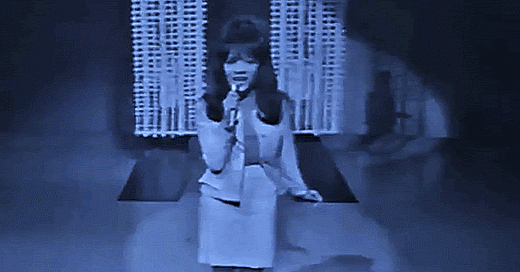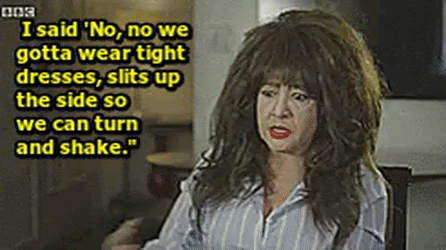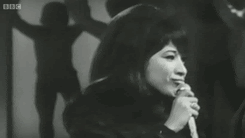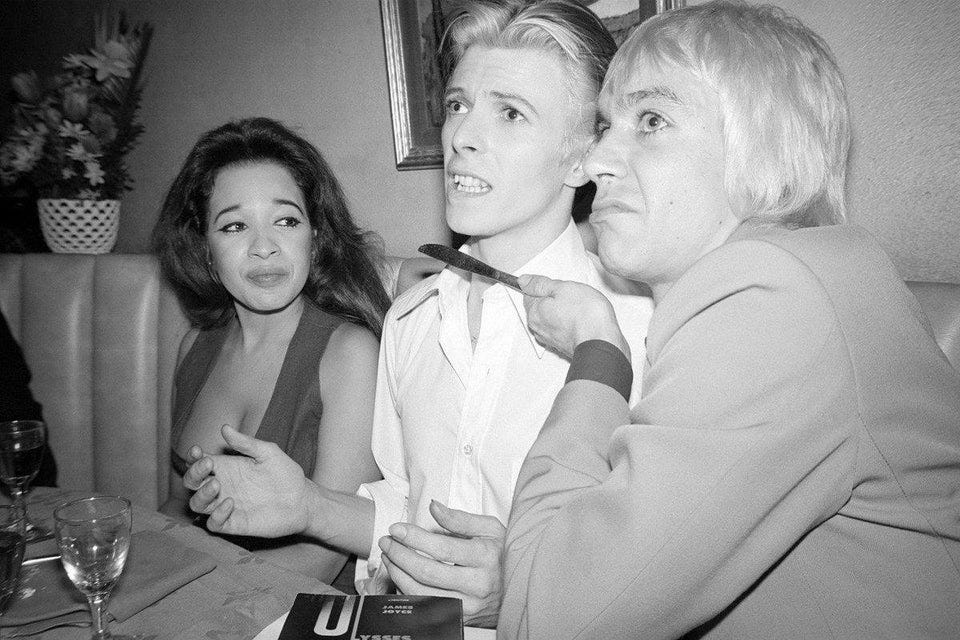Joyful shimmying forever!
The great Ronnie Spector died yesterday, and our hearts are in pieces. Spector’s long career included indelible vocal performances and a happy and artistically productive second act following her divorce from noted abuser and murderer Phil Spector. The Ronettes provided a bridge from the anodyne gentility of much of 50s pop to the wild frissons of the 60s, and then to the 70s punk aesthetic of deep emotions buried beneath lacerating guitars and 200+ beats per minute. Beloved by generations of her peers, fans, and critics, we still think Ronnie is too little-known as an influencer. She deserves a place of popular honor among such fellow musical fairy godmothers as Stevie Nicks, Linda Ronstadt, and Dolly Parton. Join us, won’t you, as we make our case.
Karen: The Wall of Sound was one of the defining soundscapes of my childhood. My father was a DJ and we always had an ocean of LPs and 45s to choose from and to me, Phil Spector’s sound blended well with Motown classics and made up a swoony, bombastic, emotional palette that was perfect for switching back and forth between dancing around the house and lying on the living room floor, dreaming of the day I’d become a teenager and my real life would start.
I was immediately drawn to what might be considered a “hard femme” style, a toughness and knowingness combined with a sweetness and a love for the dramatic that was best demonstrated by my three favs: “He’s A Rebel” by the Crystals, “Leader of the Pack” by the Shangri-Las, and “Be My Baby” by the Ronettes. When I eventually got a look at the Ronettes, I was all in, and was especially obsessed with their lead singer, Ronnie Spector, who had all the big feelings I had in her amazing voice but wouldn’t, in my mind, dissolve into tears on my playground when someone was mean to her.
Ronnie knew what she was doing
My love for “Be My Baby” was cemented in 1987 when I was 11, both by finally being allowed to watch Dirty Dancing and getting goosebumps during the opening credits as a bunch of people dance…dirtily in slow motion with “Be My Baby” playing over the whole thing and seeing a replay of the infamous culmination of years of “will they or won’t they?” on Moonlighting when Bruce Willis and Cybill Shepherd both permanently and uncomfortably imprinted themselves on my sexuality by swearing at each other and getting into one-sided slap fight before succumbing to passion and sweeping aside the contents of a glass table to roll around and make out, again, with “Be My Baby” as their soundtrack. My GOD, maybe being an adult would be as good as being a teenager?!
In 2000, I actually saw Ronnie Spector while she was touring in support of her Kill Rock Stars EP She Talks To Rainbows, produced by and featuring another one of my all-time favorites, Joey Ramone. It was pure magic--she was so warm and sexy and CONFIDENT, obviously loving being back on stage and being absolutely adored by an audience of weeping, transfixed fans ranging from their 20s to their 60s. I stood in the front row in a daze the entire time--at one point she walked along the front of the stage and touched everyone’s cheek as she sang. She was wearing fringed fingerless gloves and I still remember the feeling of the fringe on my face. I’ll never forget it.
Sophie: That image is so tender and sexy, I may pass out. I wish I’d made sure to go to one of those shows! I’m sitting here lightly agog, because everything you described – particularly your experiences with Dirty Dancing and Moonlighting and lying on the floor, marinating in all that swoony bombast and wishing for your life to begin – dovetails exactly with mine. “Be My Baby” is my favorite song of all time, and you know how many songs I love! Time passes, my taste evolves, but “Be My Baby” is forever.
The only other formative tidbit I can share is that I was in the chorus (in the way way back, where I belonged as an enthusiastic but profoundly un-gifted singer and dancer) of my high school’s production of Leader of the Pack, for which we all learned four-and-five-part harmonies for all of your favorites, and many more besides. I had known and loved many of them, but thanks to all those rehearsals, they’re part of me at a molecular level.
Before any of that could happen – before Ronnie wove her wonderful spell of approachable cool and aspirationally matter-of-fact feminine desire – pop music needed to make room for the Ronettes. The dominant pop music of the 1950s was smooth, to a fault. Smooth like a Ken doll’s nether regions, and often just as boring. Perry Como, Doris Day, Connie Francis: no disrespect to these accomplished singers, but the material they had to work with in that mind-numbingly prudish era was more sedative than seductive.
In 1961, the Shirelles softened up the ground for later girl groups with their #1 smash “Will You Love Me Tomorrow?”, and the Ronettes capitalized on that opening with a string of extraordinary singles including “Be My Baby”, “Baby I Love You”, “The Best Part of Breakin’ Up” and more, most recorded by Ronnie’s future terrible husband, Phil Spector. One of the hallmarks of all of these enduringly classic songs is that they’re sung from the perspectives of real girls. They sound like the feelings we pour into our diaries, that we confide in our friends, that we whisper into our crushes’ ears. To feel so seen and understood is a revelation!
When your own song makes you swoon
These hits led to a delightful-sounding 1964 tour of the UK with the Rolling Stones, who at the time were the Ronettes’ opening act. Fun fact, nearly 20 years later, the Go-Go’s followed a similar path, touring England for nearly a year in 1980 (though they were the opening act for The Specials).
I both love and am infuriated by so many really tough rock dudes being so into Ronnie. She deserved every bit of their adoration, and it’s clear that their desire to collaborate with her was sincere and rooted in both their respect for her artistry as well as her undeniable hotness. I’m not mad that they love her, but I am frustrated that this admiration and her clear influence on their work hasn’t translated to Classic Rock heavy rotation airplay for her. I wonder what she made of male rock singers trying to conjure her unique tone and heartfelt rasp in their vocals.
Before I had words for it, I’ve always been drawn to songs with a male vocalist sounding like he’s on the verge of tears. The palette of emotions white, Western men are socialized to express is so limited, and I like to hear them transgress that particular social barrier by being heartsick, sad, yearning, wistful, rueful. All those delicate sub-categories of sadness provide nuance! They suggest a rich inner life, even! I love hearing the possibility of reflection and growth, surviving painful experiences and continuing to seek and create better ones.
And if the sad male vocalist is an icon of tough guy masculinity? Watch out. Yes, of course The Beatles’ “This Boy” and “Girl”, and Bowie’s “Five Years” and “Heroes” are on eternal heavy rotation. Roy Orbison made a whole career out of the lump in his throat, and thank goodness!
But when’s the last time you listened to Bruce’s vocals on “Drive All Night”? He is unhinged, bellowing into the hot summer darkness about how he’s so in love that he’d gladly run the tank of his car dry to run errands for his gal, just to buy her some shoes. The only true rest he gets is in her arms. That girl’s got his love, his heart and soul, through the wind! and the rain! He is the USPS of love! That’s the stuff, man!
And where did The Boss, America’s own most important working class hero, learn to be so vulnerable on wax? The Ronettes. Girl groups, broadly, but very specifically the Ronettes. The trajectory from “Be My Baby” and “I Wish I Never Saw The Sunshine” to so much of Bruce’s imperial period is a straight line. Sonically, he’s grounded in R&B and the Wall of Sound (shout-out to sha-la-las and making the world safe for glockenspiels on pop songs). Vocally, he’s pouring Ronnie’s enticing urgency into every note. “Hungry Heart”, “Born to Run”, “Brilliant Disguise”, she’s present in every one of his vocal registers. Karen, let’s hear some more about Ronnie The Influencer!
Karen: Hell, yeah! So, all those titans of Classic Rock radio didn’t just love Ronnie, and they didn’t just incorporate her style into theirs. They wrote for and with her, too. Here are just a few of the examples of Rock Royalty explicitly and implicitly copying Ronnie Spector:
Brian Wilson of the Beach Boys has been extremely open about his love of Ronnie Spector’s voice and even wrote the heavenly song “Don’t Worry Baby” for the Ronettes, inspired by “Be My Baby.” Phil Spector made them turn it down, as Ronnie told Brian in the beautiful clip he posted on Twitter the day she died. Ronnie did eventually record it on the 1999 She Talks To Rainbows EP.
Phil Spector made a deal with the Beatles to work with them, contingent on Apple Records signing Ronnie, which they were happy to do, as they were longtime fans. The Ronettes had toured the U.K. with the Beatles and the Beatles had called on the Ronettes to come hang out with them in their hotel room during their first trip to the States when Beatlemania made it impossible for them to leave their hotel rooms. The only single to come out of the recording sessions, which were of course cut short by Phil once again being an insufferable tyrant, was the George Harrison song “Try Some, Buy Some,” which Ronnie talked shit about for years but eventually named it as one of her five favorite songs that she’d recorded.
David Bowie covered it in 2003, noting he was specifically covering the Ronnie Spector version. David and Ronnie had a fling after she left Phil, which she described in a delightful Rolling Stone interview in 2016. In 1980 Bowie wrote his own Ronnie-inspired song, “Teenage Wildlife” and in 2008 named it one of his favorite songs he’d recorded, saying “New song and a fresh approach. I know, I'm going to do a Ronnie Spector. Oh yes I am. Ersatz, just for one day…And I did and here it is. Bless. I'm still enamoured of this song and would give you two “Modern Loves” for it any time.” Now THAT’s what we call an endorsement!!!
A very normal dinner out with Ronnie, Bowie, and Iggy
When Ronnie Spector left Phil Spector, she had to start her career all over again, and one of the places she sang was the Continental Baths, a New York gay club where Bette Midler got her start. In this clip from 2018, Ronnie talks about how she realized during that time period that she had a lot of punk fans, including Johnny Thunders of the New York Dolls and The Heartbreakers, who used to come to her show and cry.
In a perfect circle of the influenced and the influencer constantly repeating, Ronnie later recorded Thunders’ very obviously Ronettes-inspired ballad “You Can’t Put Your Arms Around a Memory” which I was just complaining isn’t listed as one of the covers on the song’s Wikipedia page. More about Ronnie’s connection to punk and the ways in which she influenced and was influenced by punk is covered in the excellent Annie Fell article for Riot Fest, “Is ‘Be My Baby’ The First Punk Song Ever?
What makes her eventual creative partnership with Joey Ramone so particularly meaningful is that it solidified her punk bonafides, while bringing together two survivors of Phil Spector’s abuse to make something new and amazing without his poisonous influence. As recounted by Dee Dee Ramone, Spector produced the Ramones’ 1980 album End of the Century and famously held the band at gunpoint one night and forced them to listen to him play the Ronettes’ song “Baby, I Love You,” We love a gentle weirdo genius, but a terrifying one? No, thank you!
Not only did Billy Joel write “Say Goodbye to Hollywood” in 1976 as a direct copy of “Be My Baby,” down to using its incomparable opening drum riff, but Ronnie covered it in 1976 with the E Street Band, thus saving Bruce Springsteen’s career. What? Yep, pretty much. As discussed on the blog E Street Shuffle, Springsteen and Co. had a nasty legal battle with their former manager in the late ‘70s that kept them from being able to record new music. “Little Steven” Van Zandt took on producing a new record from Ronnie as a side gig and convinced the band, who were of course already fans, to back up Ronnie. The cover was released as a single but didn’t perform very well, because people are fools, and the rest of the proposed album never came to pass either, but it was the first time that the E Street Band was credited as such.
The only true chart hit Ronnie had post-Ronettes was her guest appearance on Eddie Money’s 1986 immortal banger “Take Me Home Tonight,” which features the lyric “Just like Ronnie sang…” and Ronnie answering “Be my little babyyyyyyyy…baby my darling…whoa oh oh oh…” The song revived both Eddie and Ronnie’s careers and may well have been the inspiration behind the 1987 “Be My Baby” double whammy of Dirty Dancing and Moonlighting, which Linda Holmes has written about so insightfully for NPR.
We love knowing that in her post-Phil life, Ronnie got to be this carefree again. Blessings upon your bouffanted head!
Perhaps inspired by Tina Turner’s powerful, world-rocking 1986 autobiography, I, Tina, co-written with rock journalist/critic and MTV News host Kurt Loder, Ronnie wrote her own book that also blew the lid off her relationship with and escape from an abusive husband/Svengali figure. Like I, Tina, Be My Baby: How I Survived Mascara, Miniskirts, and Madness, Or, My Life as a Fabulous Ronette, co-written with Vince Waldron, is often HARROWING. (Ronnie selected Zendaya to portray her in the upcoming film adaptation and WE ARE VERY EXCITED BY THIS NEWS! )
Veronica “Ronnie” Bennett, her sister Estelle Bennett and cousin Nedra Talley were a singing group out of Spanish Harlem who were pulled from relative obscurity as the headlining act at the Peppermint Lounge club where they appeared dancing and singing as Ronnie & The Relatives. They eventually auditioned for Phil Spector, who stopped playing the piano to yell "That's it! That's it! That's the voice I've been looking for!" After a rocky start, they recorded “Be My Baby” in 1963 and it was a smash hit (as well as, fun fact, the first song Cher ever sang on; she and Sonny backed Ronnie’s vocals along with Estelle and Nedra!) Whirlwind success and a UK tour during which they met and made friends with the Beatles and the Rolling Stones. The more popular they grew, the more insecure Phil became, thanks to his feelings for/obsessive need to control Ronnie.
In 1966, Phil refused to let Ronnie join the rest of the group on a US tour supporting the Beatles, sending her cousin Elaine in her stead. The Ronettes broke up in 1967, Phil and Ronnie married in 1968, and Ronnie became a virtual prisoner in the couple’s Los Angeles mansion for five years, forbidden to perform and forbidden to go anywhere alone, continually threatened at gunpoint. Her eventual escape was cinematic in its drama--with her mother’s help, Ronnie smashed through a sliding glass door and fled, barefoot. Like Tina, she lost everything in their divorce, including access to royalties, which she fought in courts for decades, and custody of their three adopted children, two of whom are twins who Phil presented to Ronnie as a surprise “Christmas present” in his typical horrifyingly creepy manner. Phil told Ronnie he would hire a hit man to kill her if she took the children.
Unlike Tina, Ronnie never had overwhelming commercial success that overshadowed the earlier work she did with her abuser. Like Tina, she was legally unable to sing the songs that had made her famous and had to start from scratch and she never again achieved the fame of her earlier days. On the other hand, also like Tina, she got her happy ending. She married her manager Jonathan Greenfield in 1982 and had two more children with him; per her obituary, she died in his arms.
She also became aware of just how influential she was and made music with a whole new crew of people for the rest of her life. Keith Richards and Ronnie had had an affair during the Rolling Stones’ 1964 trip to the US and he wrote of her in his 2010 autobiography Life, “The first time I went to heaven was when I awoke with Ronnie (later Spector!) Bennett asleep with a smile on her face. We were kids. It doesn’t get any better than that. Just more refined. What can I say? She took me to her parents’ house, took me to her bedroom. Several times, but that was the first time. And I’m just a guitar player. You know what I mean?” [!!!!!! – Eds.] The two remained friends and Richards inducted the Ronettes into the Rock & Roll Hall of Fame in 2007, pointedly noting in his speech regarding the first time he heard “Be My Baby”: “They could sing all their way right through a wall of sound. They didn't need anything. They touched my heart right there and then and they touch it still."
Richards also joined Ronnie on her 2016 album English Heart, which was a covers album of primarily British pop songs in honor of the amazing time the Ronettes had touring the UK before Phil Spector reeled them in. They sang the Ike and Tina Turner song “Work Out Fine,” with Keith taking the Ike part…surely not a mistake and yet another example of Ronnie reclaiming her past and making her present everything she wanted it to be. Surely Beyonce couldn’t have made “Lemonade” without the bedrock of Tina and Ronnie, two Black women who lived through trauma and refused to stay silent, putting it all out there in order to reclaim their stories and move on?
I’m particularly touched by the way Ronnie talked about Amy Winehouse, who very obviously took a massive amount of inspiration from Ronnie in terms of her entire look as well as her emotional, tough yet vulnerable vocal delivery. Ronnie recorded her own version of “Back To Black” and said in that 2016 Rolling Stone interview “Amy Winehouse was so great for me, because she made me feel like what I did mattered. The hair, the eye makeup. I recorded “Back to Black” three years before she died. I used to sort of make fun of her saying, “She has a beehive, but it’s sort of tilted like the Eiffel Tower,” but I don’t say that anymore since she passed because her and I became very close – even if it was through magazines.”
We wish Amy were alive to memorialize Ronnie, but in her absence, we hoist a glass in honor of both of these queens of majestic pop, and hit play on Dirty Dancing once more.
Two Bossy Dames is brought to you by:
Exclamation points!!!! Normalize them!!
The song that will surely hit #1 within the next week
And Chris Fleming’s treatise on nurse practitioners, the great truth-tellers of our time
We appreciate you, readers of Dames Nation!
Every time you tell a friend to subscribe, some woman, somewhere, shares some important things she’s learned with the world
Help us build Dames Nation by upgrading to a paid subscription on Substack ← you won’t be able to do this til February 1! All subscriptions are free til then! Don’t worry, we’ll remind you!
Share your saucy opinions with us on Twitter whether jointly as your @twobossydames, or in single size servings as @NewOldKaren & @sophiebiblio!










Read and loved every word. Brava, ladies!
English Heart is a huge favorite of mine; there are just times in your life when you need to hear Ronnie sing, no matter what.